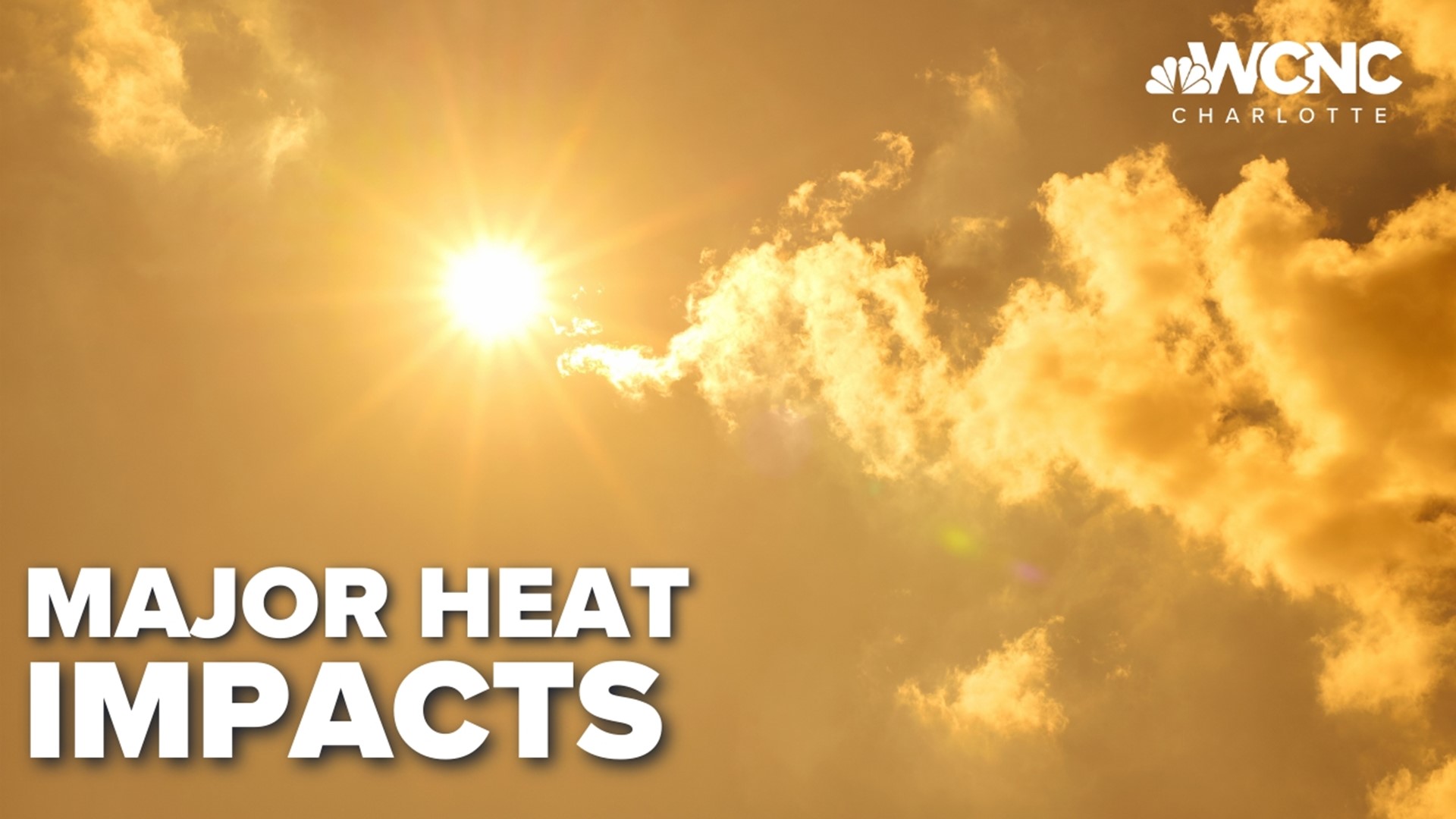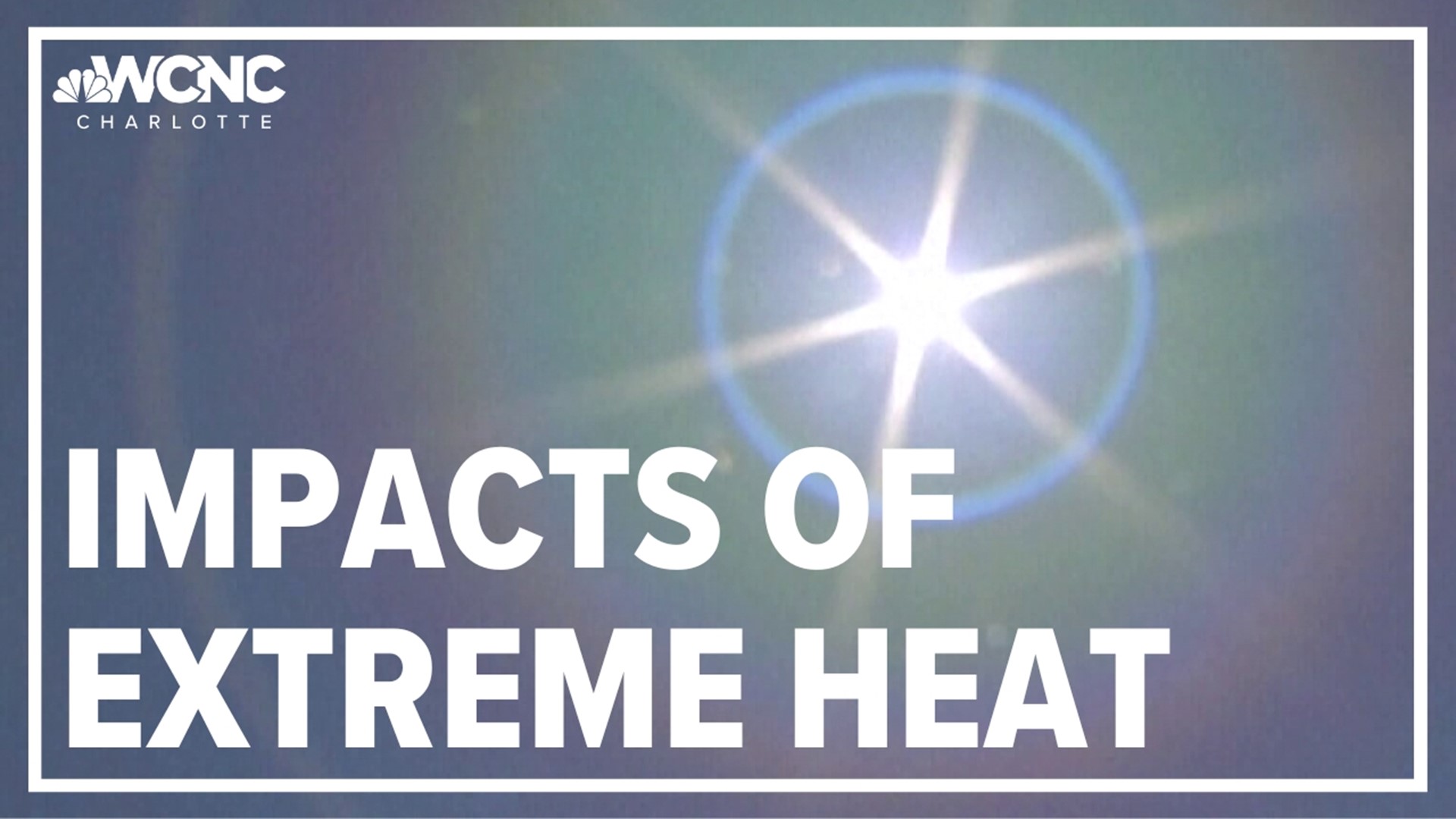CHARLOTTE, N.C. — The Charlotte area is bracing for the hottest temperatures of the year so far with a heat index that will make it feel well over 100 degrees through this weekend, Larry Sprinkle said.
Forecast high temperatures in the Charlotte metro will be in the mid-to-upper 90s with Charlotte looking at a scorching 97 degrees, which would be the hottest day of 2023. Sprinkle said the heat index, which calculates how hot it feels based on temperature and humidity, will be around 102 degrees.
And we're just getting started with even hotter weather expected this weekend in the Carolinas.
"Mid-to-upper 90s and that's not factoring in the heat index. This is way above the average of 90 degrees for this time of year," Sprinkle said. "Hot, hazy, humid, the three H-factor."
On Saturday, the WCNC Charlotte Weather Team reminds you to stay Weather Aware as the heat index climbs to 105 degrees. Heat of this degree makes it dangerous for most people to spend prolonged periods outside.
Heat Index forecast for Charlotte
Thursday: 102
Friday: 104
Saturday: 105
Sunday: 103
Monday: 95
Friday's heat index in Charlotte, and in many other locations in the Carolinas outside the mountains, is forecast to be in the triple digits. The hot weather will extend from Morganton along Interstate 40 to Raleigh with Albemarle, Chester, Concord, Lincolnton, Monroe, Mooresville, Rockingham and Shelby all expected to see a triple-digit heat index.
Saturday will be even worse, according to Sprinkle.
"We're talking about 105 degrees as we head into the weekend," Sprinkle said. "Heat index temperatures anywhere from 102 to 106."
Should Charlotte get a forecast heat index of 105 degrees, it's technically "dangerously hot" and a heat advisory would be issued by the National Weather Service, Sprinkle advised.
Heat warnings are in effect across the Midwest and Southwest as 130 million Americans are dealing with some type of excessive heat this week.
"The reason it's been so bad is the jet stream has shifted north, everything's just baking," meteorologist Chris Mulcahy said. "It's all starting to spread toward the east, where before it was the central U.S.. Now you're seeing the Midwest and the Northeast, and soon, the Carolinas."
Heat assistance for the homeless
The homeless population is very vulnerable to heat-related illness.
At Roof Above, they are providing a basic need by keeping unhoused people cool. There is air conditioning running inside the day center and they are providing folks with plenty of water. There are also large fans outside spraying water mist.
WCNC Charlotte spoke to Randall Hitt, Vice President of Unsheltered Services at Roof Above, about protecting the unhoused population during these high-heat events.
"So many of the people who come here are already quite vulnerable, already experience a lot of health elements," said Hitt. "So, when you are talking about 95 degrees, extreme heat and code red, it is only going to aggravate their situations. So, we want to be diligent in making sure people are getting what they need, that they are hydrated and shaded.
Know the signs of heat exhaustion and heatstroke
Many heat-related illnesses can be avoided.
“This heat is no joke,” Dr. Chris Branner, specialty medical director for the urgent care division of Atrium Health, said.
Prevention is key: spending time indoors (preferably in the air conditioning), taking breaks in the shade, drinking plenty of water, and avoiding the hottest part of the day. However, here are some distinguishing characteristics to keep in mind.
“When you get overheated the early signs may often be cramps of large muscle groups, like your legs or abdominal pain," Dr. Branner said.
According to the CDC, heatstroke is a medical emergency. Here's what to look out for:
- A body temperature of 103 degrees or higher
- Hot, red, dry, or damp skin
- A fast, strong pulse
- Nausea
- Headache
- Dizziness
- Confusion
- Losing consciousness
If you or a loved one is suffering from heatstroke, you should call 911 immediately. Move the person to a cooler place and try to lower their body temperature with cool compresses or a cool bath. Key importance with heatstroke: do not give the person anything to drink.
If you think someone is suffering from heat exhaustion, look for:
- Excessive sweating
- Cold, pale, and clammy skin
- A fast, weak pulse
- Nausea or vomiting
- Muscle cramps
- Tiredness or weakness
- Dizziness
- Headache
- Fainting
Branner said when you stop sweating, that's also another sign of heat stroke.
One of the biggest risks of heat exposure comes with nighttime temperatures. Our bodies are built to cool down at night as we sleep. When it's not cool at night, it puts more strain on our bodies and can increase the risk of heart disease and other medical issues.
Since the 1980s, the average temperature at night in Charlotte has increased 1.4 degrees, according to Climate Central. Nighttime temperatures are rising at twice the rate of daytime temperatures. These temperature trends cause more use of air conditioning and thus also puts a larger strain on power grids.
Heat is the deadliest weather-related hazard in the U.S., and warming nights worsen heat-related health risks.
Contact Lexi Wilson at lwilson@wcnc.com and follow her on Facebook, Twitter, and Instagram.
WCNC Charlotte’s Weather IQ YouTube channel gives detailed explainers from the WCNC Charlotte meteorologists to help you learn and understand weather, climate and science. Watch previous stories where you can raise your Weather IQ in the YouTube playlist below and subscribe to get updated when new videos are uploaded.


